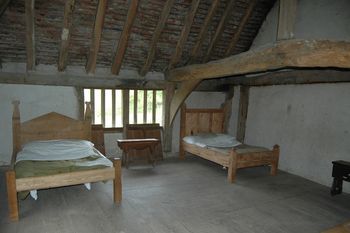Living Standards and Material Culture in English Rural Households 1300-1600: Digital Archive
Alice Forward, Ben Jervis, Chris Briggs, Mathew Tompkins, Tomasz Gromelski, 2021. https://doi.org/10.5284/1085022. How to cite using this DOI
Data copyright © Chris Briggs, Ben Jervis, Alice Forward unless otherwise stated
This work is licensed under a Creative Commons Attribution 4.0 International License.
Primary contact
Ben
Jervis
Lecturer in Archaeology
School of History, Archaeology and Religion,
Cardiff University
John Percival Building
Colum Drive
Cardiff
CF10 3EU
Wales
Tel: 02920 875611
Resource identifiers
- ADS Collection: 3781
- DOI:https://doi.org/10.5284/1085022
- How to cite using this DOI
Overview

This archive consists of three databases of evidence about medieval possessions and material culture: an archaeological database, and two databases drawn from archival material. The latter databases are accompanied by a deposit of photographs of archival documents.
The archaeological dataset was collected from 15 historic counties. For example we used Surrey and the Greater London Historic Environment Records (HER) to provide the data for the old county of Middlesex. Each HER was contacted and where necessary visited, to access any reports that were not available online or as digital copies. The initial search criteria were based upon four points. Firstly, our date range (1300 - 1600) crosses two periods within many of the HER search criteria and therefore both medieval and post-medieval had to be included within the search. This meant that searches were both inclusive (searches which included wider date parameters which also covered out period of study, for example 1000BC - AD1700) and exclusive (only covering the very specific date range set out by the project, 1300 - 1600). Secondly, we were gathering data specifically from excavated sites. Activities such as fieldwalking or general stray or individual finds were not included. Thirdly, only secular, and non-high status sites were included (high-status was regarded as a place such as a manor or castle). Fourth, with the exception of the two county case studies (Wiltshire and Worcestershire), any town that appears in the top 50 largest towns in the 1377 poll tax returns was not included. Each site that fitted within the search criteria was subsequently checked as to whether any non-ceramic finds were retrieved through excavation.
There are two historical / archival datasets: one comprising material collected from the records of the escheator and dating mainly from c.1370 - c. 1480; and one consisting of roughly equivalent material extracted from the records of the coroner from the period c. 1480 - 1600. These documents are held at The National Archives (TNA), Kew. The escheators were royal officials who, as part of their role collecting a variety of royal revenues, were charged with appraising and liquidating the goods and chattels of felons, fugitives and outlaws. The escheators' records contain a good deal of information about these goods and chattels and their value. There were around 25 - 30 escheators, each responsible for an 'escheatry' consisting of a county of pair of adjacent counties; the project focussed on nine escheatries. Coroners held inquests to establish the cause and circumstances of violent or unnatural death. The reports from these inquests often included inventories of the goods seized from the murderers and suicides.
The photographic archive contains images of both the escheator and coroner's records consulted for this project and taken at TNA, between 2016 and 2019.
A fuller description of the archive is provided in the project data paper: Briggs, C., Forward, A. and Jervis, B. (2021). 'Living standards and material culture in English Rural households 1300-1600'. Data Paper, Internet Archaeology 56. https://doi.org/10.11141/ia.56.14






